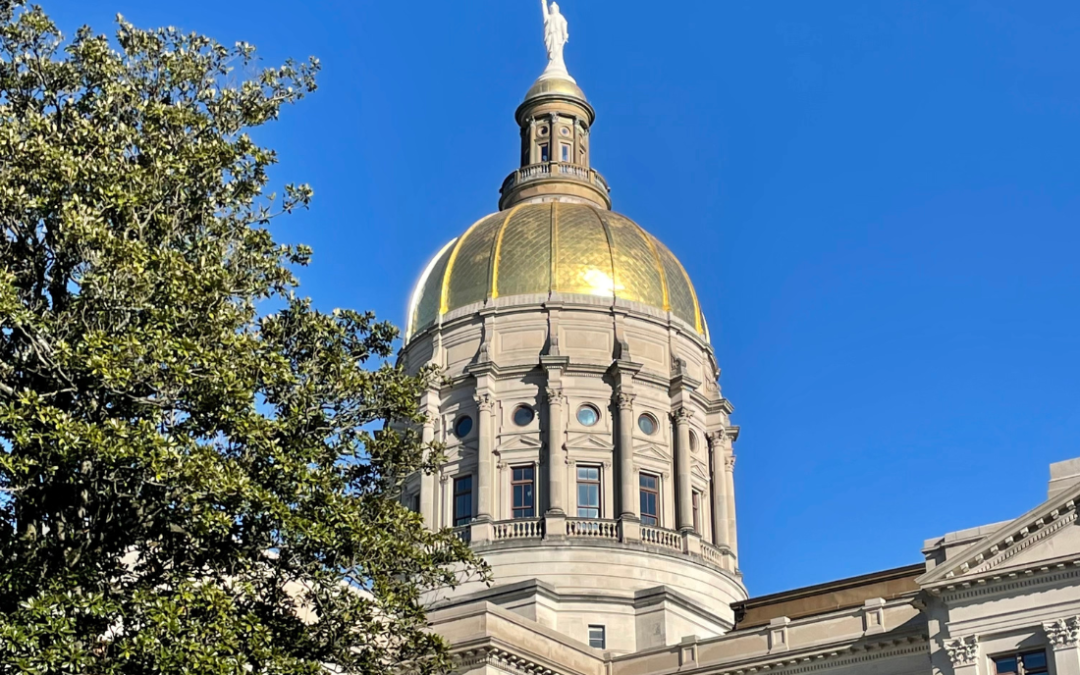As informed citizens, I knew you’d want to read about some of the laws that went into effect yesterday. This is not a complete list of new Georgia laws, but it includes the ones I thought would be of most interest to those in the 156th district. If you want a more thorough summary of this year’s session, you can read an article I wrote here.
Tax Cuts & Truth in Government Fees
HB 1015: Income Tax Cut for Individuals
Summary: We lowered the state individual income tax rate from 5.49% to 5.39%. Over the next few years, it will be lowered to 4.99%. This is effective on income earned beginning on January 1, 2024.
HB 1023: Income Tax Cut for Corporations
Bill Summary: The corporate income tax rate will be the same as the individual income tax rate.
Previously, the corporate rate was 5.75%. Aligning these two rates is important for Georgia families because MOST corporations in Georgia are small family businesses.
SB 340: Tax Cut for Farmers
Bill Summary: It extends the Georgia Agricultural Tax Exemption (GATE) to diesel exhaust fluid used for agricultural purposes.
HB 461: Regulatory Fees
Bill Summary: It amends Georgia Code relating to the imposition of regulatory fees by local governments. Local governments must use fees collected for the related regulatory activity and not for general operations.
Additionally, ‘registered investment advisors’, ‘shooting galleries and firearm ranges’, and ‘firearms dealers’ are added to a list of businesses to which local governments may not charge a regulatory fee.
Public Safety
HB 404: Protecting Communities from Slum Lords
Bill Summary: This law requires that rental properties must be fit for human habitation. Furthermore, landlords must not requiring a security deposit exceeding two months’ rent. A tenant failing to pay charges owed is afforded a three business day written notice period prior to eviction proceedings being filed. The notice must be posted conspicuously on the property door in a sealed envelope and delivered via any methods agreed to in the rental agreement.
In essence, this law protects renters from “slum lords.” Consequently, this protects the general public from unsightly and blighted properties, which have a negative impact on property values in the community.
HB 827: Livestock Theft
Bill Summary: HB 827 increases the penalty for livestock theft to between two and 15 years imprisonment, and increases the maximum fine to $10,000. Appropriately, the Department of Agriculture commissioner is provided with authority to enforce this crime.
SB 159: Contraband in Prisons
Summary: It enhances penalties for persons who bring prohibited items beyond guard lines for purposes of providing items to inmates. The bill provides a penalty for any employee or contractor of the Department of Corrections who is found guilty of bringing prohibited items into the facility for an inmate punishable by a 10-year term of imprisonment.
SB 420: Foreign Ownership of Farmland
Summary: It prohibits a person who is not a U.S. citizen or legal resident, is an agent of a foreign government designated as a foreign adversary, and has been out of the country for a period of time preceding the acquisition of land from acquiring directly or indirectly any possessory interest in agricultural land or land within a 10-mile radius of a military installation. This excludes residential property.
Any possessory interest in agricultural land acquired by a nonresident alien through inheritance will be disposed of within one year after acquisition. Any interest acquired in the collection of debts will be disposed of within two years after acquisition. A broker will timely disclose to their client the requirements regarding relevant land acquisition.
Violations will be considered a felony with punishment of a fine up to $15,000 and imprisonment of between one to two years.
SB 63: Offenses Requiring Bail
Summary: It prohibits a municipality from creating a policy that mandates releasing a person from jail on unsecured bail.
It expands the list of criminal offenses that require bail to make sure criminals show back up for court. All offenses added to the Code are crimes with victims involved – crimes like battery, theft, trafficking, and domestic terrorism. It also strengthens Georgia law to stop illegal aliens from posting bail and fleeing the country. This has become a serious problem in some Democrat-run municipalities.
If a person was convicted of a felony within the past seven years, then they are not eligible for an unsecured judicial release.
Note: The bill is being opposed by liberal groups. Therefore, it is currently not in effect.
Safety on Our Roads
HB 500: Arson of Law Enforcement Vehicles
Bill Summary: The bill creates the offense of arson of a law enforcement vehicle. If convicted, then violators will be fined up to $100,000, imprisoned five to 20 years, or both.

SB 10: Drag Racing
Summary: SB 10 makes it a misdemeanor offense to knowingly be present and facilitate a drag race, which can include using a vehicle to block a portion of the roadway nearest to the race. The bill adds the crime of reckless stunt driving to the list of charges that prevent progress from Class D to Class C license.
Fines are increased. Also, any motor vehicle of a person arrested for reckless stunt driving after a previous conviction of the same offense is declared contraband. Consequently, it will be subject to civil asset forfeiture.
SB 352: Squatted Vehicles
Summary: It is unlawful to alter the suspension system of many vehicles so that the frame height of the front is more than 4″ higher than the rear.
Basically, this bill outlaws “squatting” of vehicles. Why? They have proven to be unsafe for the occupants of the squatted vehicle and especially for other vehicles in accidents.

Child Safety
SB 335: Protecting Children from Incest
Bill Summary: Known as the ‘Safeguarding Adopted Children from Sexual Violence Act,’ the law expands the crime of incest to include adoptive relationships.
HB 993: Grooming Minors for Abuse
Bill Summary: HB 993 creates a criminal penalty for those who groom a minor through a pattern of activity or communication, and through a third party or the use of electronic means to persuade, induce, entice, or coerce that minor to engage in a sexual offense, human trafficking, or any other offense within the Georgia Code.
A person who commits this crime will be subject to felony imprisonment of one to five years. This crime only applies to a person over 18 and who is not within four years of age of the alleged victim. This applies to conduct within or outside of Georgia if the actions occurred within this state.
HB 409: School Bus Safety
Bill Summary: The bill requires public school systems to consider bus routes that do not cause a student boarding a school bus to cross roadways with a speed limit over 40 mph. Also, individuals who pass a stopped school bus that is picking up children are guilty of a high and aggravated misdemeanor. A fine of at least $1,000, confinement of at least 12 months, or both, will be assessed to those convicted.

SB 351: Social Media and Protecting Minors Online
Summary: It requires parental consent for social media accounts for minors. It requires the Department of Education and local boards to adopt policies on social media, cyberbullying, and internet usage. Social media companies must verify that users are at least 16 unless they receive approval from the parents. It requires websites whose material is over one-third harmful to minors to verify users are at least 18.
New Healthcare Laws
HB 557: Drug Prescription by Some Nurses & PAs
Bill Summary: It authorizes advanced practice registered nurses and physician assistants to prescribe hydrocodone, oxycodone, or their compounds in emergency situations under certain circumstances. These circumstances include good standing with the applicable medical board and at least one year of post-licensure clinical experience. The patient receiving the prescription must be at least 18 years old.
The bill only allows for an initial prescription that does not exceed a five-day supply. Authorization must be included in the provider’s nurse protocol agreement and physician assistant’s job description.
HB 663: No Patient Left Alone
Bill Summary: HB 663 allows for a designated essential caregiver to be present with a patient or resident of a hospital or long-term care facility while they are receiving care. This caregiver must obey the policies of the hospital or long-term care facility. If not, then their access may be suspended or terminated.

HB 1335: Personal Care Facilities
Bill Summary: HB 1335 requires personal care homes to always have at least two on-site administrators or direct care staff. The law requires a staff person to be on every occupied floor unless the facility has implemented a medical alert system.
SB 430: Repeal of COVID-19 Signs
Bill Summary: It repeals requirements for COVID-19 warning signs placed at business entrances or on entry tickets for public gatherings.
Elections-Related Laws
HB 974: Ballot Security
Bill Summary: It requires visible watermark security features on ballots. Additionally, it mandates the Secretary of State to create a pilot program moving away from confusing QR codes or bar codes to the human-readable text portion of the ballot. It requires the Secretary to establish a statewide system for the posting of scanned paper ballots for public inspection. High-resolution digital images of ballots will be available by 5:00 p.m. the second Friday following the election.
HB 1207: Non-citizens May No Longer Be Poll Workers
Bill Summary: HB 1207 requires any person employed by a county election superintendent for election-related duties to be a United States citizen. Amazingly, this was not the case before.
It provides guidelines for reopening the candidate qualifying period in specified circumstances.
The bill requires election superintendents to provide a ballot proof to any candidate appearing on the ballot so the candidate may verify the information.
HB 1207 provides access to poll watchers for specified voting locations and activities.
Other New Georgia Laws
HB 51: Transporting Students
Bill Summary: The law allows local boards of education to utilize alternative means of transportation other than school buses to transport students to school-related activities.
Frequently, a school has a small group of students that need to go off campus for an event. Examples include FFA leadership, the chess team, or a trio group. Instead of tying up a school system’s large van or bus to transport a small group, it makes sense to allow a qualified school employee or group sponsor to transport the students in a small vehicle.
HB 934: Self-Service Storage Facilities
Bill Summary: HB 934 permits a self-service storage facility rental agreement to be executed and delivered electronically. If the occupant fails to sign the agreement within 14 days, the continued use of the storage space will be deemed acceptance of the agreement. Furthermore, the rental agreement will be enforced against the occupant as if it had been signed.
HB 1053: Prohibits Cryptocurrency
Bill Summary: HB 1053 prohibits governmental agencies from accepting a digital currency issued by a federal reserve bank or foreign central bank as payment. In addition, it prohibits governmental agencies from participating in any test of a central bank digital currency.
SB 73: Do Not Call List & False Attorney Ads
Bill Summary: SB 73 allows citizens on the Do Not Call List who receive more than one unauthorized telephone solicitation within any 12-month period to bring an action against the person or entity that made the solicitations and/or the person or entity the telephone solicitations were made on behalf of for injunctive relief and damages.
Basically, the bill directs the State Bar of Georgia to establish rules regulating solicitations in ads relative to legal services. This includes prohibitions on false representations, depictions of individuals appearing to be employees or clients of the attorney. The disclosure of the location of place of business of the solicitor is required. If any person or entity is found to be in violation, then they will incur a penalty of $10,000.
SB 354: Licensing Regulations
Bill Summary: SB 354 removes cosmetology licensing requirements for those who only shampoo hair, blow-dry hair, or apply cosmetics.
SB 454: Child Support
Bill Summary: SB 454 revises the child support award calculation worksheet and the rates. It clarifies that the definition of custodial parent applies to the parent who earns the lesser amount of gross income, and changes the process of editing child support awards to include a low-income adjustment system rather than a deviation.
The bill allows disability benefits received by the child from the U.S. Department of Veterans Affairs to count against the noncustodial parent’s final child support amount.
Conclusion
As a reminder, this is not an exhaustive list of all bills that became Georgia law on July 1. However, they are the ones constituents have contacted me about or that I thought would be of most interest. The Georgia General Assembly has a great website where you may research all legislation filed. You can find it here. If you have trouble navigating that site, please contact me. I’ll be happy to help you learn how it works. Anyone interested in what the state legislature is doing will find it to be a great resource.
Thank you so much for allowing me to serve as your representative under the Gold Dome. I appreciate each and every one of you. If I can ever be of assistance to you, you may reply to this email or contact me at Leesa.Hagan@house.ga.gov.
Happy Independence Day!
Regards,

